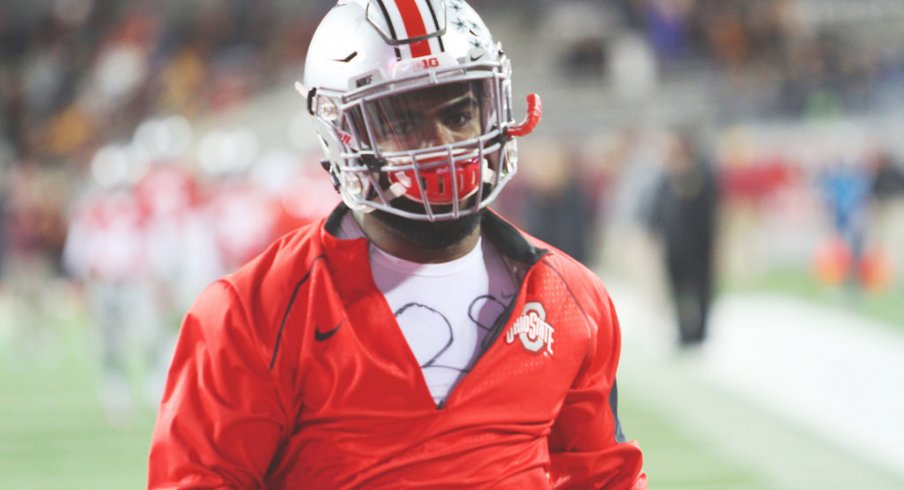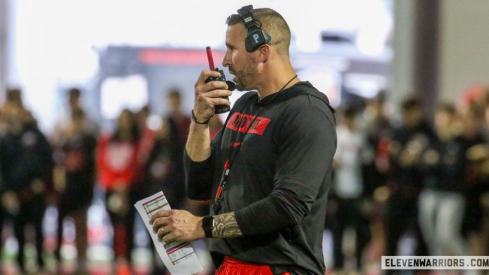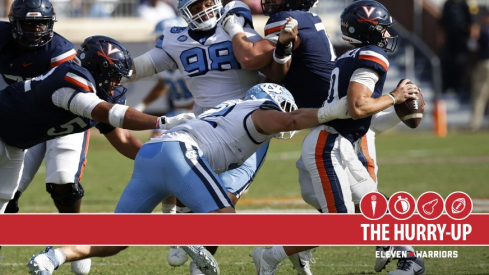With the way Ohio State's offense performed all game against Michigan State, there were bound to be some frustrations from those both inside and on the outside looking in at Urban Meyer's program.
Ezekiel Elliott took it to a larger plateau, however, seeking out an opportunity to speak to the media and then ripping Meyer's play calling in a passionate interview minutes after the 17-14 loss.
There are multiple ways you can look at his comments, which Vico and I discuss below.
Was Elliott out of line to question Meyer, who led the Buckeyes to a national championship in just his third season in Columbus? Elliott is the team's star and face of the program, but was his outburst and its timing a representation of immaturity or merited due to the poor performance?
Vico: When I first read the news about what Elliott said, I was inclined to believe the former. Indeed, there is a lot in what he said that grabs attention. After watching our video of Elliott's monologue in front of the press, I think it's more the latter.
Elliott's comments suggested an honest frustration with his relative disappearance from the game plan and a disappointment with a poor game plan altogether. The negative reaction it's generating, especially from college football journalists and NFL folk (from what I've gathered), does not square with Elliott's valid frustrations nor does it square with the straightforward and somewhat muted tone in his delivery. It was histrionic-free criticism. From what I gathered, Urban Meyer seemed to agree in his post-game press conference.
Eric: I'm all for a player speaking his mind, but I do think the timing of Elliott's could have been better. Ohio State's game plan and execution against Michigan State was awful, but Elliott going out of his way to complain about not getting the ball enough and wondering why Meyer wouldn't give him an explanation could shed some light on how he is as a player.
He also made sure everyone knew there was "no way" he would return to Ohio State next season, even though his team could potentially have at least three games (or more if they somehow make the Playoff) left. Even if players know they're turning pro, it's typically standard practice to keep that information to yourself until the season is over.
Elliott is often praised by Meyer as a team leader and a great representation of the values he's instilled in the program. As heated as he was after the loss, Elliott could have masked his frustrations better. Especially considering how much he's been in front of a camera this season.
Elliott spoke his mind, and his comments were echoed by a bulk of the fanbase. However, should he have kept it in house because of the magnitude of the loss being so fresh?
Eric: I think that would have been a better way of handling it. Everyone knew Elliott would leave after this season regardless of how it ended for Ohio State, but openly questioning Meyer in a world where the Internet spreads information faster than ever before was never going to end well.
Elliott turned into a national celebrity with how well he played in the 2014 post-season, something he had to cope with off the field over the summer, as anyone would. It's an adjustment, but Meyer's continual insistence that Elliott's handled it all as well as or better than any player he's had before did not show up Saturday after the game. Any frustrations he had should have been kept in house.
Vico: It was interesting to see some program alumni (Andrew Sweat comes to mind) take to Twitter to criticize Elliott for what he said. I'm dismissive of the criticism coming from college football journalists and NFL folk, who tend to prefer that players not speak truth to power in any context whatsoever. However, I've never played organize football myself nor do I know what an Ohio State locker room is like in that situation. How Elliott's comments are received among his colleagues in the locker room will make for interesting gossip, even if we as fans will never know the full extent of the fallout.
If Elliott should have kept his comments "in house," it's not necessarily for the timbre in his voice or the substance of what he said. Consider this a strategic problem for Elliott. He gains some expressive utility in clarifying his mid-week infection that kept him hospitalized. He also had critiques of the offensive game plan that conforms well to what the typical Buckeye fan would say on a call-in radio show this work week. Sometimes we need to vent.
However, his comments were unlikely to sit well with those with vested interests on this issue. It could rub the locker room the wrong way. However, I think Elliott was wise to take to Twitter to thank his offensive line after he made his comments. It will become a "maturity" question in the spring when Elliott prepares for the NFL Draft. No doubt, a slew of scouts representing morally bankrupt billionaires will probe Elliott about his comments and perhaps his proclivity to speak his mind even if it may run against the interests of the owners who will be paying him a rookie contract next fall. Whereas Elliott wants what an NFL owner could provide him, his comments suggest a low shadow of the future (i.e. he prefers the proverbial dollar today rather than the actual dollar that will come tomorrow).
The other major concern is his relationship with Tim Beck, Ed Warinner, and head coach Urban Meyer. Whereas Elliott is the most complete player on offense Ohio State has seen in some time, I doubt there is an issue of sitting Elliott as punishment for what he said.
Again, these are all ultimately strategic issues. The problem is not a normative "right or wrong" issue. I don't think there's anything Elliott said, or how he said it, that was "wrong."
Are Elliott's comments a result of how he carries himself or simply an act of passion?
Vico: I'm more inclined to believe an act of passion. Prefacing his comments with a clarification of his mid-week infection underscores that. Selfish players don't pass-protect or lead block as hard as Elliott does.
I do see one related concern. If Elliott's criticisms and corollary declaration of intent for the 2016 NFL Draft come with a disengagement from the offense, that would not necessarily speak well of him. I think my biggest fear about the nature of the loss, especially this late in the season, is that key players on the roster with an eye to the NFL will effectively go into business for themselves. We saw a similar issue bite talent-laden Alabama teams hard in 2008 and 2013.
However, it concerns what happens next week and in January for the bowl game. Consider it an "unknown" at the moment.
Eric: Elliott is a passionate player. There's no denying that. But he's been put on a pedestal because of his sheer talent and production following his breakout 2014, just like some other stars of the team. If you're a leader of your team, you're supposed to act with a tad more eloquence.
He's bound to be a high NFL Draft pick, but it's going to be difficult for executives and team presidents to look past such outbursts if they continue. And, if he's willing to express his emotions publicly about not coming back, his star teammates could do the same and the season could spiral downward for Ohio State.


